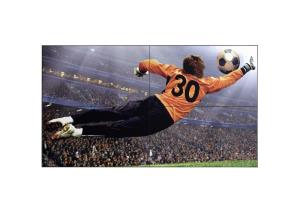


| Part Number: | 49VL5G |
| Language: | NS |
Seamless Large Screens with Ultra-Narrow Bezel
The ultra-narrow bezel creates a visually stunning digital wall to effectively deliver dynamic content and immerse the viewers. The large screen it generates is enough to captivate the attention of passersby.
Image Gap Reduction
The VL5G series includes an image improvement algorithm that can reduce image gaps among tiled displays when playing back videos. Objects located on the bezel boundaries are adjusted for a seamless viewing experience.
Higher Viewing Angle
Large screens are usually positioned higher than human-eye level, making uniform picture quality essential for video walls. The viewing angle of the VL5G series is high enough to display vivid colors throughout the screen with no distortion.
Wide Viewing Angle
It is well known that LG IPS panel technology enables better control of liquid crystals, which in turn allows the screen to be viewed from virtually any angle. Because of this, the VL5G series captures the attention of and captivates more viewers with lifelike colors, regardless of their viewing position.
Easy Color Adjustment
Depending on the content, the color temperature of the display can be easily adjusted in increments of 100K using a remote control.
White Balance Adjustment
In conventional video walls, white balance was adjustable only in "full-white" mode, but the VL5G series allows you to modify each value of grey scale to achieve more detailed and precise white balance adjustment.
User-Friendly Menu Structure
The menu structure has been optimized for commercial use. It simplifies approach flows and groups similar functions together, adopting a more intuitive GUI for ease of use. This way, users can avoid having to do trial-and-error when exploring desired functions and managing displays.
Intuitive GUI
The GUI (Graphic User Interface) is carefully designed with a four-way navigation remote control that lets users easily switch to other settings. Also, it adopts a large font for better visibility, which is necessary when users want to control displays from relatively far distances.